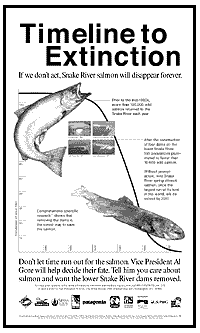forum
library
tutorial
contact

Dam-Removal Activists Turn to Ads for Support
by Jonathan BrinckmanThe Oregonian - October 23, 1999
|
the film forum library tutorial contact |

|
Dam-Removal Activists Turn to Ads for Supportby Jonathan BrinckmanThe Oregonian - October 23, 1999 |
Sponsors advertise their position in The New York Times
in hopes of putting the breaching issue in the national spotlight
 Conservationists and tribes promoting dam removal have launched an advertising campaign in The New York Times in an effort to gain Vice President Al Gore's attention and press the White House into taking action on the Columbia River Basin's declining salmon.
Conservationists and tribes promoting dam removal have launched an advertising campaign in The New York Times in an effort to gain Vice President Al Gore's attention and press the White House into taking action on the Columbia River Basin's declining salmon.
"Don't let time run out for salmon," reads the first full-page ad, which ran in Wednesday's editions. "Vice President Al Gore will help decide their fate. Tell him you care about them and want the lower Snake River dams removed."
The campaign caps a significant shift over the last year from advocacy centered in the Northwest toward a national discussion of the contentious subject. Led by Save Our Wild Salmon in Seattle, the effort seeks to build support in the eastern United States for breaching the four dams, and it does so by targeting the Clinton administration.
"This is another level of escalation," said Bill Arthur, Northwest/Alaska region director of the Sierra Club. "We want to show that this a national issue being decided -- not just parochial."
Gore is considered key. The ads' sponsors said they think the vice president should force the administration to take a position on breaching Snake River dams and also force federal agencies to stick to a timetable for making their recommendations on breaching.
The National Marine Fisheries Service was until recently committed to recommending by April whether breaching -- removing the dams' earthen portions and allowing the river to flow around the concrete structures -- is the best way to restore Snake River salmon. But federal officials this summer raised the possibility that they would delay any recommendation until they gathered more scientific information on the proposal.
Conservationists oppose delays, arguing that decisive action is required if wild Snake River salmon -- all protected under the Endangered Species Act -- are to be saved. Congress would ultimately decide any measures to breach the dams, which generate power and make the river navigable by barge.
"We're reminding Vice President Gore and the administration that Gore has to step up and reclaim his historic role of leadership on the environment," said Arthur of the Sierra Club. "Gore can't continue to come to the Northwest and have no answer on this issue."
Significantly, the conservationists are backed by four Native American tribes with treaty rights to Columbia River Basin salmon. Those tribes, who have long espoused breaching the dams, had focused most of their efforts within the Northwest.
No longer.
"Our concerns are being ignored within the region, and we believe this issue needs to go to the national level," said Don Sampson, executive director of the Columbia River Inter-Tribal Fish Commission. "Al Gore is the key."
Administration officials who asked not to be identified said they had seen the first advertisement.
Elliot Diringer, a spokesman for Clinton's Council on Environmental Quality, said the administration was working to develop a widely supported salmon-restoration plan that is firmly grounded in science.
"This is a complicated issue with a lot of interested parties," Diringer said. "We are doing our level best."
Chris Lehane, a Gore spokesman, said, "This matter is currently under review, and the vice president is committed to working with the people of the Northwest to resolve this important issue."
Placing the ads -- three more will run over the next three months -- will cost $138,000. The money comes from donors within the Northwest, said Pat Ford, executive director of Save Our Wild Salmon.
"It was some wealthy folks, they care about salmon, and they were pretty disgusted," Ford said.
Industrial users of the river are not impressed. Frank Carroll, a spokesman for Potlatch Corp. in Lewiston, Idaho, said the conservationists are seeking to build national support for breaching because they are not getting it from within the region. Potlatch uses the dammed river to transport pulp and paper products.
Bruce Lovelin, executive director of the Columbia River Alliance, said environmental groups are running the ads because they know science is showing dam breaching is not necessary. He called it a desperate move.
"Once you get political, once you put this kind of money into play, you can't predict the outcome," Lovelin said. "You're rolling the dice."
learn more on topics covered in the film
see the video
read the script
learn the songs
discussion forum
